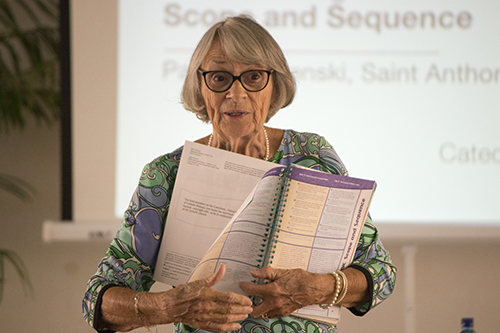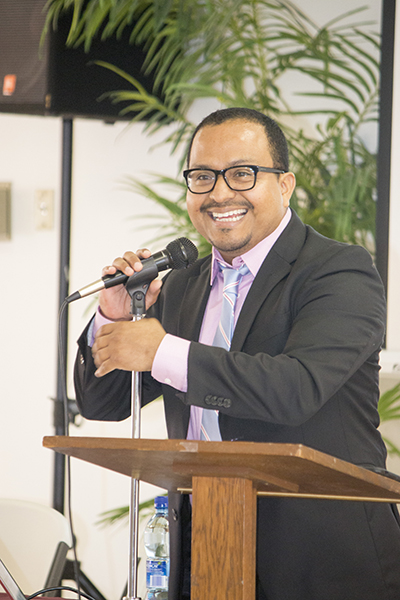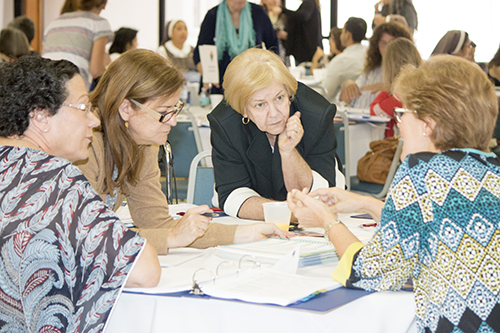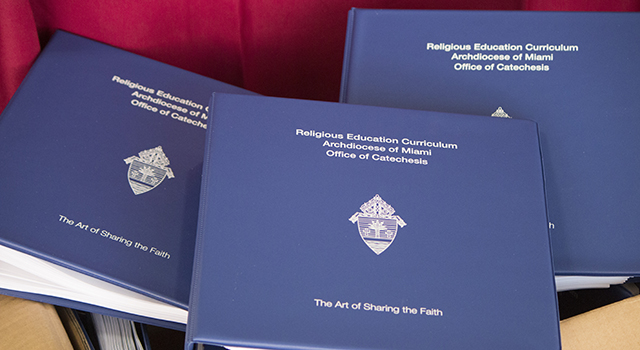By Ana Rodriguez Soto - The Archdiocese of Miami

Photographer: ANA RODRIGUEZ-SOTO | FC
Patricia Solenski, director of religious education at St. Anthony Parish in Fort Lauderdale and a member of the committee that drafted the new curriculum, explains it to catechetical leaders at their gathering in June.
MIAMI | Looking from the outside in, religious education seems like a hit-or-miss process: Not the step-by-step curriculum used in schools, but a disjointed sacramental preparation. First Communion. Then confirmation. And possibly nothing in between.
But that’s not the way it’s meant to be, and a new curriculum to be implemented next fall in the Archdiocese of Miami aims to change that mindset. It also includes a bonus unique to the archdiocese: standards and assessment tools for students with special needs.
“For the first time, we have been able to identify the indicators that we believe can support the faith development of our kids with special needs. That’s completely new,” said Peter Ductram, archdiocesan director of the Office of Catechesis.
Miami’s catechetical curriculum had last been updated in 2006. It ran for about 50 pages. The new curriculum is twice that long, excluding the introduction. It also reflects the priorities of the most recent archdiocesan synod.

Photographer: ANA RODRIGUEZ-SOTO | FC
Peter Ductram, director of the archdiocesan Office of Catechesis, explains that the new curriculum aims for a "creative and holistic systematic catechesis," not a catechesis geared toward reception of the sacraments.
Based on the four pillars of the catechism and the six key elements of catechesis, it lists 14 standards, or topics, that must be covered every year, from the Creed to the sacraments, from conscience to Christian living, from Catholic social teaching to vocations.
For example, on the standard of vocations, “we want our kids to start thinking about what God is calling them to from early on,” Ductram said, and all the way from pre-kindergarten to eighth grade.
The goal is to make sure that catechists and catechetical leaders emphasize all six of the key elements every year.
“If you go through the whole year without talking about vocations, there’s something missing in that program. If you go all year without an outreach to the poor, there’s something missing in that program. If you go all year without praying the rosary, there’s something missing in that program,” Ductram said.
The curriculum also lists what students should know at each stage, and gives catechists strategies for teaching it along with ways of assessing if their students have learned.
That’s where the archdiocesan curriculum is unique, Ductram said. Its section on “adaptive catechesis” lists teaching strategies and assessment tools for children with special needs, be they cognitive, auditory, visual or affecting mobility.
“We want to facilitate the role of the catechists so they are not overwhelmed, searching for tools,” he said. “So the catechists won’t feel that they are watering down the faith.”
He noted that 1 out of every 60 children is diagnosed with special needs. The archdiocese has 34,000 students in religious education programs, a number that rises to 68,000 when adding those enrolled in Catholic schools.
“Where are those thousand (special needs) kids going? Who is accompanying them? Who is accompanying their families?” asked Ductram. “They need to be accompanied from early on, not only for the reception of the sacraments.”

Photographer: ANA RODRIGUEZ-SOTO | FC
Catechetical leaders discuss the new curriculum at the June meeting where it was introduced.
The new curriculum was introduced in June to more than 100 catechetical leaders from 84 parishes. It will go into effect in the fall of 2018. The archdiocese’s 6,000 catechists will receive their training next April.
“There’s nothing new in our curriculum. It’s just a new way of doing it,” Patricia Solenski told the catechetical leaders at the June meeting. A veteran educator, Solenski directs religious education at St. Anthony Parish in Fort Lauderdale, and was a member of the committee that helped craft the curriculum.
The group also included two experts in special education, two experts in curriculum development, two experts in dogmatic theology and an expert in liturgy. They began their work in December 2015.
Ductram says the new approach is geared toward achieving a “creative and holistic systematic catechesis.” The problem is, “How do we make this a reality when the parents are coming in with a sacramental mindset?”
His answer: by finding new and creative ways of teaching their children. “Engaging them in storytelling, engaging them in conversations that are more relational to what they’re going through. This is what the Church teaches. How is this affecting you in your daily life?”
“In my dream, I see a catechesis that avoids emulating how a classroom works,” Ductram said. “Even schools are coming up with new ways of engaging kids.”
Maybe religious education programs should take place Sunday mornings, rather than Saturdays or weeknights; not only to engage parents in the learning process but to accommodate their schedules, he noted. “Parents want to spend time with their kids doing stuff, and especially busy working parents.”
His ideal class would take no longer than 45 minutes, perhaps include a video no longer than seven minutes, send the children forth with a task for the week, and conclude with Mass.
“Mass has to be an integral part of the learning process,” Ductram said.
He sees the new archdiocesan curriculum as setting thorough standards for learning while allowing room for creativity and experimentation.
“I believe having a standard allows us to dream together,” he said. “It’s not an imposition. It’s a framework so we can start dreaming from here.”
Hear Scott Hahn, Hosffman Ospino at Catechetical Conference
Scott Hahn and Hosffman Ospino will deliver the keynote addresses in English and Spanish at the 2017 Catechetical Conference of the Archdiocese of Miami, to be held Saturday, Nov. 4, at the DoubleTree Convention Center in Miami.
The conference is not just for catechists. It’s open to everyone who wants to deepen their knowledge of Scripture, the sacraments, liturgy, prayer and Catholic morality.
This year's speakers and musicians include: Timothy Matovina, Father Tony Ricard, Immaculate Heart of Mary Sister Pat McCormack, Maria Covarrubias, Charleen Katra, Father Manny Alvarez, Father Armando Tolosa, and Jackie Francois.
Registration is $50, which includes a box lunch; or $55 the day of the event. For information and registration, visit miamicatechesis.org.


Comments from readers